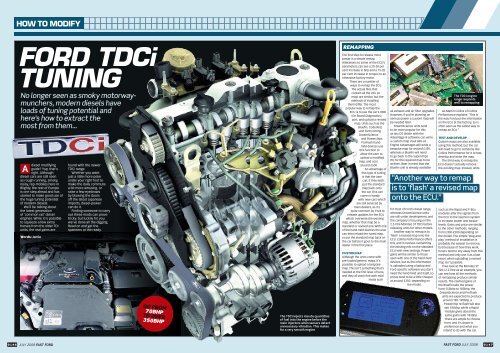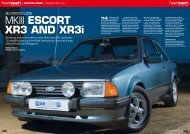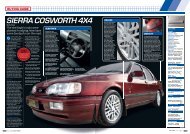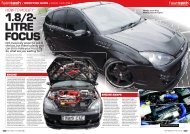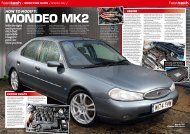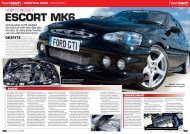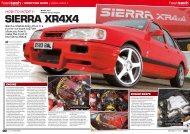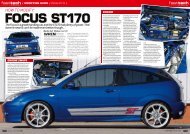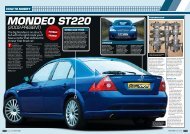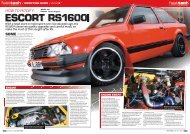FORD TDCi TUNING HOW TO MODIFY - Fast Ford
FORD TDCi TUNING HOW TO MODIFY - Fast Ford
FORD TDCi TUNING HOW TO MODIFY - Fast Ford
Create successful ePaper yourself
Turn your PDF publications into a flip-book with our unique Google optimized e-Paper software.
How to modify<br />
<strong>FORD</strong> <strong>TDCi</strong><br />
<strong>TUNING</strong><br />
No longer seen as smoky motorwaymunchers,<br />
modern diesels have<br />
loads of tuning potential and<br />
here’s how to extract the<br />
most from them…<br />
a<br />
diesel modifying<br />
guide? Yup, that’s<br />
right. Although<br />
diesel cars are still seen<br />
as rough-running, smoky,<br />
noisy, rep-mobiles here in<br />
Blighty, the rest of Europe<br />
is one step ahead and has<br />
started to make good use of<br />
the huge tuning potential<br />
of modern diesels.<br />
We’ll be talking about<br />
the latest generation<br />
of ‘common rail’ diesel<br />
engines. While it is possible<br />
to squeeze a few extra<br />
horses from the older TDi<br />
units, the real gains are<br />
Words: Jamie<br />
0146 july 2008 <strong>Fast</strong> <strong>Ford</strong><br />
found with the newer<br />
<strong>TDCi</strong> range.<br />
Whether you want<br />
just a little more poke<br />
under your right foot to<br />
make the daily commute<br />
a bit more amusing, or<br />
raise a few eyebrows<br />
by blowing the doors<br />
off the latest Japanese<br />
imports, diesel-power<br />
can do it.<br />
Finding someone to carry<br />
out these mods can prove<br />
tricky, but luckily for you<br />
we’ve done all the digging.<br />
Read on and get the<br />
spanners at the ready.<br />
go from<br />
70bhp<br />
to over<br />
350bhp<br />
The <strong>TDCi</strong> injects minute quantities<br />
of fuel into the engine before the<br />
main injectors when sensors detect<br />
unnecessary vibration. This makes<br />
for a very smooth engine<br />
remapping<br />
The first step to release more<br />
power is a simple remap.<br />
Alterations to some of the ECU’s<br />
parameters can see a 20-30 per<br />
cent increase in bhp and a 15-20<br />
per cent increase in torque on an<br />
otherwise factory motor.<br />
There are a number of<br />
ways to remap the ECU.<br />
The actual files that<br />
contain all the info (or<br />
map) are similar, but the<br />
methods of installing<br />
them differ. The most<br />
popular way to remap the<br />
ECU is to use the car’s OBD<br />
(On Board Diagnostics)<br />
port, and upload a revised<br />
map. Units such as the<br />
Bluefin, Code:Red,<br />
and forthcoming<br />
DreamScience<br />
and Powerchips<br />
ProFlash handheld<br />
devices use<br />
this function to<br />
allow the user to<br />
upload a modified<br />
map, and cost<br />
around £500.<br />
An advantage of<br />
this type of tuning<br />
is that the user<br />
can, if they wish,<br />
put the standard<br />
map back onto<br />
the car. This can<br />
come in handy<br />
with new cars which<br />
are still serviced by<br />
main dealers, as it’s<br />
quite common for <strong>Ford</strong> to<br />
release updates for the ECU<br />
which overwrite the existing<br />
map, whether that map be a<br />
standard or revised one. With one<br />
of the hand-held devices the user<br />
can then reload the tuned map,<br />
or put the standard map back on<br />
the car before it goes to the main<br />
dealer in the first place.<br />
Custom map<br />
Although the units come with<br />
pre-loaded generic maps, it’s<br />
possible to upload a bespoke<br />
map. This isn’t something that’s<br />
needed at the first level of tune,<br />
and they all work fine with mild<br />
mods such<br />
as exhaust and air filter upgrades.<br />
However, if you’re planning on<br />
serious power a custom map will<br />
be needed later.<br />
DreamScience units tend<br />
to be more popular for this<br />
as any DS dealer with the<br />
Advantage III software can write<br />
a custom map. Paul Hills at<br />
Engine Advantages will write a<br />
bespoke map for around £350,<br />
whereas a Bluefin will need<br />
to go back to the Superchips<br />
HQ for the required map to be<br />
written. Bear in mind that the<br />
Bluefin unit is already available<br />
for most of <strong>Ford</strong>’s diesel range,<br />
whereas DreamScience units<br />
are still under development, and<br />
the company’s focusing on the<br />
2.2-litre Mondeo ST <strong>TDCi</strong> before<br />
releasing units for other models.<br />
Another way to remap is to<br />
‘flash’ a revised map onto the<br />
ECU. Collins Performance offers<br />
this, and it involves overwriting<br />
the existing info on the standard<br />
ECU with new settings. Power<br />
gains will be similar to those<br />
seen with one of the hand-held<br />
devices, but as the information<br />
is uploaded using a laptop and<br />
<strong>Ford</strong>-specific software you don’t<br />
need the hand-held unit itself, so<br />
prices tend to be a little cheaper<br />
at around £350, depending on<br />
the model.<br />
The <strong>TDCi</strong> engine<br />
range responds<br />
well to remapping<br />
As Martin Collins of Collins<br />
Performance explains: “This is<br />
the way <strong>Ford</strong> put the information<br />
on the ECU at the factory, so is<br />
often seen as the safest way to<br />
remap an ECU.”<br />
test and develop<br />
Custom maps are also available<br />
using this method, but the car<br />
will need to go to someone like<br />
Collins Performance for it to test,<br />
develop and write the map.<br />
The third way to remap the<br />
ECU doesn’t actually remove<br />
the existing map. Instead, units<br />
“Another way to remap<br />
is to ‘flash’ a revised map<br />
onto the ECU.”<br />
such as the Rapid and P-Box<br />
modules alter the signals from<br />
the ECU to the injection system<br />
to increase power and torque<br />
levels. Gains and price are similar<br />
to the other methods, ranging<br />
from £300-£500 depending on<br />
the model. The simple ‘plug-andplay’<br />
method of installation is<br />
probably the easiest to remove,<br />
but because of how they work,<br />
tuners tend to shy away from this<br />
method and only use it as a last<br />
resort when uploading a revised<br />
map isn’t possible.<br />
If we look at the Mondeo ST<br />
<strong>TDCi</strong> 2.2-litre as an example, you<br />
can see how all the methods<br />
of remapping produce similar<br />
results. The claimed gains of<br />
the Bluefin take the power<br />
from 155bhp to 185bhp, the<br />
DreamScience and ProFlash<br />
units are expected to produce<br />
around 185-190bhp, a<br />
Powerchip re-flash will also<br />
see 185bhp, while a Rapid<br />
module gives about the<br />
same gains with 183bhp.<br />
There are ample to choose<br />
from, and it’s down to<br />
preference and what you<br />
intend to do with the car.<br />
<strong>Fast</strong> <strong>Ford</strong> july 2008<br />
0147
HOw <strong>TO</strong> mODIFy<br />
tdci engine<br />
The <strong>TDCi</strong> engines aren’t<br />
much to look at, but a spot<br />
of colour coding can help<br />
exhaust and air Filter<br />
The next step after a remap is to<br />
get the engine breathing better.<br />
An uprated panel filter from the<br />
likes of K&N is the cheapest and<br />
easiest way to unleash a few<br />
more bhp. Depending on the<br />
model, prices will vary between<br />
£30-50. With no other mods,<br />
except the previous remap, you<br />
will see a couple of extra bhp, but<br />
don’t expect massive gains as<br />
you simply won’t get them with a<br />
panel filter on its own.<br />
An induction kit may free up a<br />
bit more power and vary in price<br />
from £80-100. A lot of modern<br />
cars have extremely cramped<br />
engine bays which mean<br />
induction kits can often suck in<br />
hot air and some believe they<br />
can actually lose power over the<br />
standard set-up. Cold air feeds<br />
and heat shields are available<br />
to combat this problem, but the<br />
best advice is to speak to a tuner<br />
and see what they suggest for<br />
your particular car.<br />
However, combine an uprated<br />
air filter with a decent exhaust<br />
system and you can look forward<br />
to an improvement of around<br />
10-15bhp. Again, because diesels<br />
are so new to the UK tuning<br />
market many of the big names in<br />
performance exhausts don’t yet<br />
produce off-the-shelf upgrades.<br />
One of the few is Piper, with<br />
its products for the Mk2 Focus,<br />
including all the diesel range.<br />
Prices start from £150 for a<br />
stainless rear section up to<br />
£450 for an ST replica twin-<br />
exit system.<br />
Other than this you will be<br />
looking at custom exhaust<br />
systems to get rid of the<br />
unwanted gases. This is no bad<br />
thing as you get an exhaust that<br />
fits your car perfectly, and you<br />
can have any combination of<br />
single or twin exit, bore size and<br />
tailpipe design you want.<br />
With a custom exhaust you<br />
have the option of a cat-back<br />
or a full turbo-back system<br />
including a de-cat pipe.<br />
Performance 3000 offers a<br />
custom exhaust service, and<br />
while actual costs depend on the<br />
model in question, typical prices<br />
for a cat-back system range from<br />
£300-350 and from £400-450 for a<br />
full system including de-cat pipe.<br />
On the subject of de-cat pipes,<br />
unlike petrol-engined cars, there<br />
is only one emissions test for<br />
diesels as part of the MoT, and<br />
most modern diesels will pass<br />
this without the use of a catalytic<br />
converter. Performance 3000’s<br />
Mike Randino explains how a<br />
de-cat can actually improve the<br />
emissions test results: “With a<br />
cat fitted, when people drive<br />
around town or in traffic the<br />
cat can actually gather carbon<br />
deposits and start to block up<br />
(which hinders performance<br />
anyway), and then when it comes<br />
to the MoT, the tester will hold<br />
the engine at high revs to get<br />
intercoolers<br />
Another area that needs<br />
attention is the intercooler. On<br />
any turbocharged car, diesel or<br />
petrol, reducing the air charge<br />
temps plays a critical part in the<br />
pursuit of power. Also, contrary<br />
to popular belief, a well designed<br />
and better flowing intercooler<br />
can reduce turbo lag as well as<br />
massively dropping inlet temps.<br />
As the diesel-tuning scene is<br />
so new in the UK finding off-theshelf<br />
replacement intercooler<br />
upgrades is practically<br />
impossible. However, there<br />
are a number of companies<br />
who will make a custom<br />
intercooler and all the necessary<br />
pipework to make it fit.<br />
Performance 3000 offers this<br />
service for around £700, and<br />
Pro Alloy is also keen to get<br />
involved with development<br />
work for diesel intercoolers.<br />
However, if you own a<br />
Mondeo ST <strong>TDCi</strong> there are a<br />
few off-the-shelf intercoolers,<br />
although they are not branded<br />
as diesel intercoolers. The<br />
new Focus ST uses the same<br />
intercooler as found in the ST<br />
<strong>TDCi</strong>, so the upgrades available<br />
for the Focus will also fit the<br />
Mondeo. With the capability<br />
of over 400bhp they should<br />
be more than up to the job.<br />
A Pro Alloy uprated Focus ST<br />
intercooler costs around £550,<br />
so are slightly cheaper than<br />
custom jobbies and have<br />
already been proven in the<br />
Focus ST market.<br />
Larger intercoolers will allow<br />
you to safely run more boost, so<br />
another remap will be required<br />
to make the most from the<br />
intercooler upgrade.<br />
a reading and all the carbon<br />
deposits get blown out the back<br />
as black smoke. With a de-cat<br />
pipe fitted this doesn’t happen,<br />
and it helps performance too.”<br />
Looking once again at our<br />
Mondeo ST <strong>TDCi</strong> example, with<br />
an uprated air filter and freeflowing<br />
de-cat exhaust system<br />
you should be expecting to see<br />
another 15-20bhp, which when<br />
combined with the remap<br />
will see you with around the<br />
200bhp figure.<br />
Although not many people<br />
in the UK have dabbled<br />
with fitting bigger turbos<br />
to diesels yet, thankfully<br />
our European cousins<br />
have. One example is<br />
David Daniels who owns<br />
Belgian tuning company<br />
Street Performance. He<br />
has successfully fitted<br />
what he calls a ‘Stage 1’<br />
turbo upgrade to his own<br />
Mondeo ST <strong>TDCi</strong>.<br />
Most turbos fitted to the<br />
<strong>Ford</strong> <strong>TDCi</strong> range are VNT<br />
turbos (Variable Nozzle<br />
Turbine), which differ<br />
from conventional ones.<br />
VNTs feature a series of<br />
movable secondary vanes<br />
in the turbo housing, which<br />
alter the angle and speed<br />
at which the exhaust<br />
gases hit the turbine.<br />
These are so accurate<br />
that most VNTs don’t<br />
even require a wastegate,<br />
as the movement of the<br />
secondary vanes can keep<br />
the boost pressures at a<br />
safe level.<br />
The way VNTs work<br />
also allows the use of an<br />
‘overboost’ function, which<br />
means you can temporarily<br />
run extra boost at low<br />
engine speeds when it is<br />
safe to do so, and then<br />
back off the boost as the<br />
engine revs increase. <strong>Ford</strong><br />
makes use of this function<br />
on many standard <strong>TDCi</strong><br />
models, and tuners can<br />
exploit this for big results.<br />
The first stage of turbo<br />
upgrade is a hybrid unit.<br />
On the ST <strong>TDCi</strong> David<br />
uses a Garrett GT17/21V<br />
which has a standard exhaust<br />
housing (as the exhaust<br />
housing actually forms part<br />
of the exhaust manifold on<br />
the ST <strong>TDCi</strong>) but uses a larger<br />
compressor wheel on the inlet<br />
side. It is similar in size to the<br />
Garrett T35 as found on the<br />
big-turbo Escort Cosworth,<br />
and allows more airflow at the<br />
standard boost pressure.<br />
This turbo combined<br />
with an intercooler upgrade<br />
and a custom-mapped<br />
DreamScience has seen<br />
David’s car produce 230bhp<br />
and 370lb/ft at a reduced<br />
boost level of 1.5bar from the<br />
previous 1.7bar. He explains:<br />
“It makes more power and<br />
torque than before with less<br />
strain on the engine.”<br />
buy it noW<br />
David can sell you one of<br />
his ‘Stage 1’ turbos for just<br />
£300, but you will need to<br />
add shipping costs to the UK.<br />
Although David is currently<br />
focusing on the 2.2-litre<br />
“Getting power from a diesel engine<br />
means making a bigger bang.”<br />
Mondeo ST <strong>TDCi</strong> engine, the<br />
same principals will apply to<br />
all diesel engines, so drop<br />
him an e-mail to discuss what<br />
options are available for you.<br />
The next step requires an<br />
even bigger turbo. According<br />
to David: “Getting power from<br />
a diesel engine means making<br />
a bigger bang. The more air<br />
you get in, the more power<br />
you will have, but also the<br />
more fuel you will need to<br />
stop things melting. The fuel<br />
pump on the Mondeo ST <strong>TDCi</strong><br />
is capable of supplying fuel at<br />
the injectors at 2000bar, and<br />
the standard system only runs<br />
at 1600bar, so there is plenty<br />
of scope to run more boost.”<br />
A bigger turbo will require<br />
a different exhaust manifold,<br />
and probably a different<br />
exhaust system to mate with<br />
the increased size of the<br />
exhaust housing. Initially you<br />
will be able to get away with<br />
standard injectors, but if you<br />
plan to run huge amounts<br />
of boost either modified or<br />
higher-flowing items will<br />
be needed. At present this<br />
remains uncharted territory,<br />
but David hopes to have<br />
a 250-300bhp package<br />
available for the ST <strong>TDCi</strong> by<br />
the summer. He has even<br />
got a 400bhp upgrade on<br />
the cards.<br />
It is possible to produce<br />
even more power from a<br />
diesel engine by running<br />
two turbos together.<br />
This is well and truly<br />
into competition and<br />
motorsport grounds, so<br />
has the price tag to match,<br />
and is called ‘compound<br />
turbocharging’. This<br />
basically involves running<br />
two turbos in series, so<br />
that the raised pressure<br />
output of the first turbo is<br />
fed into the second, which<br />
increases the pressure<br />
again. With this method it<br />
has been known for racing<br />
diesels to produce up to<br />
9bar of boost pressure<br />
– that’s a mammoth 130psi.<br />
0148 july 2008 <strong>Fast</strong> <strong>Ford</strong> <strong>Fast</strong> <strong>Ford</strong> july 2008 0149<br />
turbos<br />
Variable nozzle turbos are trick<br />
bits of kit. We reckon they’ll<br />
end up on more modified cars<br />
over the next few years<br />
This cutaway demonstrates the<br />
vanes in the ‘open’ position.<br />
Compare it with the ‘closed’ vanes<br />
in the pic top left of this page
HOw <strong>TO</strong> mODIFy<br />
tdci engine<br />
1.4 litre<br />
custom engine Builds<br />
Running bigger turbos and<br />
increased boost will often<br />
mean the need for serious<br />
internal engine modifications,<br />
which come with a seriously<br />
hefty price tag. In principal<br />
the same modifications<br />
can be made to a diesel<br />
engine as a petrol one, but<br />
the limiting factor is the<br />
availability of performance<br />
parts meaning expensive,<br />
bespoke components often<br />
have to be used.<br />
As with petrol engines,<br />
porting and polishing the<br />
head will free up a few more<br />
bhp, as will fitting different<br />
profile camshafts and bigger<br />
valves. The only problem<br />
is that no-one currently<br />
produces performance parts<br />
like these for the diesel range,<br />
so you would either need to<br />
have them custom made, or<br />
see what other existing items<br />
are available and modify them<br />
to suit.<br />
1.6 litre<br />
The same is true of the<br />
bottom end. H-beam con<br />
rods and forged pistons<br />
will aid reliability and will<br />
probably be needed when<br />
the standard power output<br />
has been increased by 50<br />
per cent or more. However,<br />
these will set you back<br />
around £2000 alone, without<br />
all the other necessary parts,<br />
machining work, and bespoke<br />
mapping needed for a custom<br />
engine build.<br />
Even the 1.4 <strong>TDCi</strong><br />
can be made into an<br />
impressive performer<br />
transmission<br />
If you’re planning a custom engine<br />
build, or to run a remarkable increase<br />
in power and torque then the standard<br />
transmission will need looking at.<br />
It’s not the bhp that will cause<br />
transmission problems but torque, and<br />
modified diesels have bucket loads of<br />
it, especially if the torque limiter has<br />
been removed or tampered with at the<br />
remapping stage.<br />
Thankfully most of the gearboxes<br />
fitted to the <strong>TDCi</strong> range, including the<br />
MTX75 and six-speed MMT ‘boxes, have<br />
quite strong gear teeth and are not<br />
prone to breaking easily.<br />
According to gearbox experts<br />
Competition Transmission Services:<br />
“Unless you are running super sticky<br />
slicks you have one very useful safety<br />
valve – wheelspin. With the amount<br />
of torque diesels produce you are<br />
inevitably going to lose traction on the<br />
front wheels, which from the gearbox’s<br />
point of view is a good thing as it<br />
instantly relieves the amount of stress it<br />
has to deal with. One thing which is well<br />
worth doing though is fitting an ATB diff,<br />
otherwise you’ll struggle to get any of<br />
the power down.”<br />
An ATB for the MTX75 ‘box as found<br />
in the Focus models will cost £600, and<br />
one for the six-speed Mondeo ST <strong>TDCi</strong> is<br />
£650, but will help get the power down<br />
and reduce torque-steer.<br />
If you are running big power and use<br />
the car on track or at the drag strip it<br />
may be worth getting the gears shotpeened<br />
and super-finished to ease the<br />
likelihood of stress-related fractures.<br />
CTS can take care of this for around<br />
£400-450.<br />
2.0 litre<br />
0150 july 2008 <strong>Fast</strong> <strong>Ford</strong> <strong>Fast</strong> <strong>Ford</strong> july 2008 0151<br />
fast<br />
faCt<br />
The ‘TD’ in <strong>TDCi</strong> stands<br />
for ‘Turbo Diesel’, the<br />
‘C’ refers to the engine<br />
being ‘Common Rail.’<br />
hoW much?<br />
The following table gives an indication<br />
of what power levels you can expect to<br />
see at each of the different stages of tune.<br />
The figures are based on accumulative<br />
modifications, and are estimates only. The<br />
actual power output of your car may vary, and<br />
will depend on the modifications made.<br />
Re-map<br />
(bhp)<br />
Exhaust and<br />
air filter (bhp)<br />
2.2 litre<br />
Intercooler<br />
(bhp)<br />
Turbo<br />
(bhp)<br />
fiesta 1.4 tdCi (70bhp) 80-90 90-95 100-110 110-150<br />
fiesta 1.6 tdCi (90bhp) 115-120 120-125 125-135 135-180<br />
foCus 1.8 tdCi (100bhp) 125-130 130-135 135-145 145-180<br />
foCus 1.8 tdCi (115bhp) 135-140 140-145 145-155 155-190<br />
foCus 2.0 tdCi (134bhp) 155-160 160-170 170-180 180-220<br />
mondeo 2.0 tdCi ( 130bhp) 155-160 160-170 170-180 180-230<br />
mondeo 2.2 tdCi (155bhp) 185-190 190-200 200-220 220-350<br />
SPECIALISTS<br />
Code:Red<br />
(Profile Automotive)<br />
0161 4069797<br />
www.codered-chiptuning.de<br />
CTS<br />
01582 840008<br />
www.gearboxman.co.uk<br />
DreamScience<br />
01482 224433<br />
www.dreamscience.co.uk<br />
Performance 3000<br />
01935 427554<br />
www.performance3000.com<br />
Piper Exhausts<br />
01303 245300<br />
www.pipercams.co.uk<br />
Powerchips<br />
(Collins Performance)<br />
01260 279604<br />
www.powerchips.co.uk<br />
Pro Alloy<br />
0845 226 7561<br />
www.proalloy.co.uk<br />
Street Performance<br />
david@streetperformance.be<br />
Superchips<br />
01280 816781<br />
www.superchips.co.uk<br />
TyPICAL PrICES<br />
(based on 2.2-litre Mondeo ST <strong>TDCi</strong>)<br />
Bluefin ..........................£500<br />
K&N 57i ........................£100<br />
Custom exhaust ....£400-450<br />
Uprated intercooler .....£550<br />
Stage 1 turbo ...............£300<br />
Quaife ATB ....................£650<br />
next<br />
month<br />
ZVH Tuning


